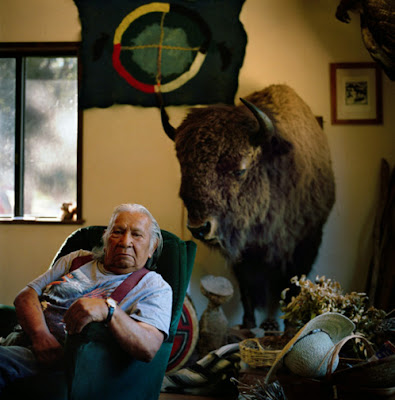I mourn the loss of Charles "Red Hawk" Thom, Sr., Northern California Native American Karuk medicine man and ceremonial leader, who passed away last Tuesday (Oct.8) at the age of 85. He was one of the last traditional medicinemen (shaman) who had been trained in the old ways. Known to many as the guardian of Mt. Shasta and the other ceremonial sites in Northern California and Oregon, he was also an esteemed elder to the Karuk, Kiowa and Hoopa tribes; faithfully serving his people for many years as the keeper of their culture, traditions and sacred knowledge. He was instrumental in getting official federal recognition for his tribe and was a catalyst in the legalization of Native American ceremonies. Grandpa Charlie was also involved in natural resource management and the protection of their sacred tribal grounds.
Born in Fort Jones, California on April 4, 1928 and orphaned at a very young age, Charlie Thom was raised by the elders of his tribe in the ancient medicine ways of the Karuk Arara (Up River People), who have possibly lived in the same area since the Ice Age. As a child, he was hidden from the authorities who required all the Native American children to be taken to boarding schools for assimilation, and was brought up instead to be a medicine man. He was one of the remaining few who fluently spoke his ancestral Karuk language, and had vast knowledge on his people's history, ceremonies, stories, sacred songs and dances. Grandpa Charlie was considered a "Living National Treasure" by his tribe.
Charlie leading a Sweat Lodge ceremony on Panther Meadows in Mt. Shasta
"Red Hawk Walking Backwards" was his ceremonial name, which signified his sacred path in retracing his people's cultural heritage. 40 years ago, he made his sacred sweat lodge ceremonies public, attracting people far and wide. In 1983, Charlie Thom addressed the UN Delegates in the United Nations at the Dag Hammarskjold Auditorium to plea for help in protecting their sacred ceremonial sites. A ceremonial leader, environmental-social activist, teacher and spiritual guide, Grandpa Charlie has guided hundreds of people from all over the world to live in the wisdom of the ancient ways and to exist in harmony with nature, with each other and with themselves.
Known to his friends and family as a kind, humble, gentle, generous and light-hearted person, hundreds of people worldwide mourn the loss of Grandpa Charlie. He was pre-deceased by 4 of his children; but survived by 14 others, as well as numerous grandchildren and great-grandchildren, who will miss him. We should all remember him in our hearts as an eternal teacher and guide who lived as he preached, and as a concrete example of how we can all live in harmony with all of creation.











